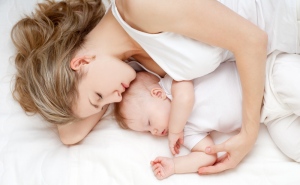Newborns were more likely to die while sharing a bed compared with older infants, say doctors who want parents to know about the risks.
Sudden infant death syndrome (SIDS) and other sleep-related causes of infant death have known risk factors but researchers wanted to know if the factors differed by age group.
In a total of 8,207 deaths analyzed, the majority of the infants, 69 per cent, were bed-sharing at the time of death, researchers said in Monday’s issue of the journal Pediatrics. In bed-sharing, the infant shares the same sleeping surface with another person.
Younger infants were more likely bed-sharing compared with babies aged four months to just under a year (73.8 per cent vs. 58.9 per cent.)
“The predominant risk factor for younger infants (up to three months of age) is bed-sharing, whereas rolling to prone, with objects in the sleep area, is the predominant risk factor for older infants (four months to 364 days),” Dr. Jeffrey Colvin of Children’s Mercy Hospitals and Clinic in Kansas City, Mo., and his co-authors concluded.
“Parents should be warned about the dangers of bed-sharing, particularly in 0- to three-month-old infants.” They also suggested that parents should be reminded that cribs should be clear of objects so that if an infant rolls, there is no risk of rolling into something that increases the risk suffocation.
The Canadian Paediatric Society reaffirmed its recommendations for safe sleep environments for infants and children in February.
“The recommended practice of independent sleeping will likely continue to be the preferred sleeping arrangement for infants in Canada, but a significant proportion of families will still elect to sleep together,” the society’s position statement said. “The risk of suffocation and entrapment in adult beds or unsafe cribs will need to be addressed for both practices to achieve any reduction in this devastating adverse event.”
The group noted that evidence suggests bed-sharing with an adult who is extremely fatigued or impaired by alcohol or drugs (legal or illegal) that impair arousal can be hazardous to an infant.
Canadian coroners have also warned about the hazards
Source: cbc news


